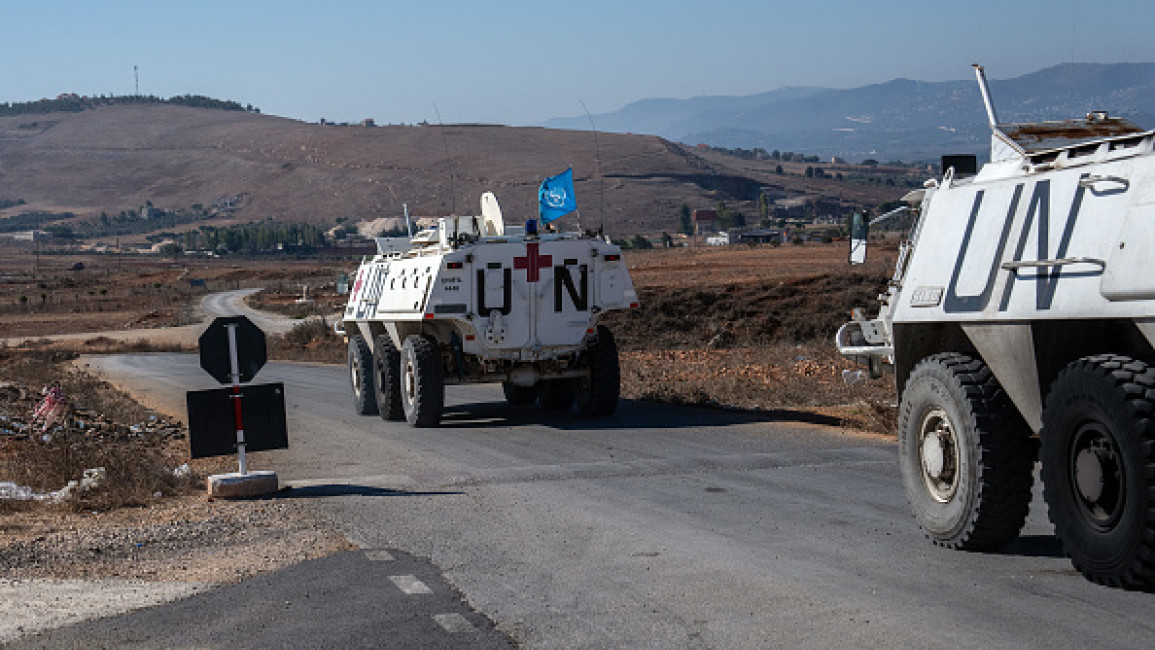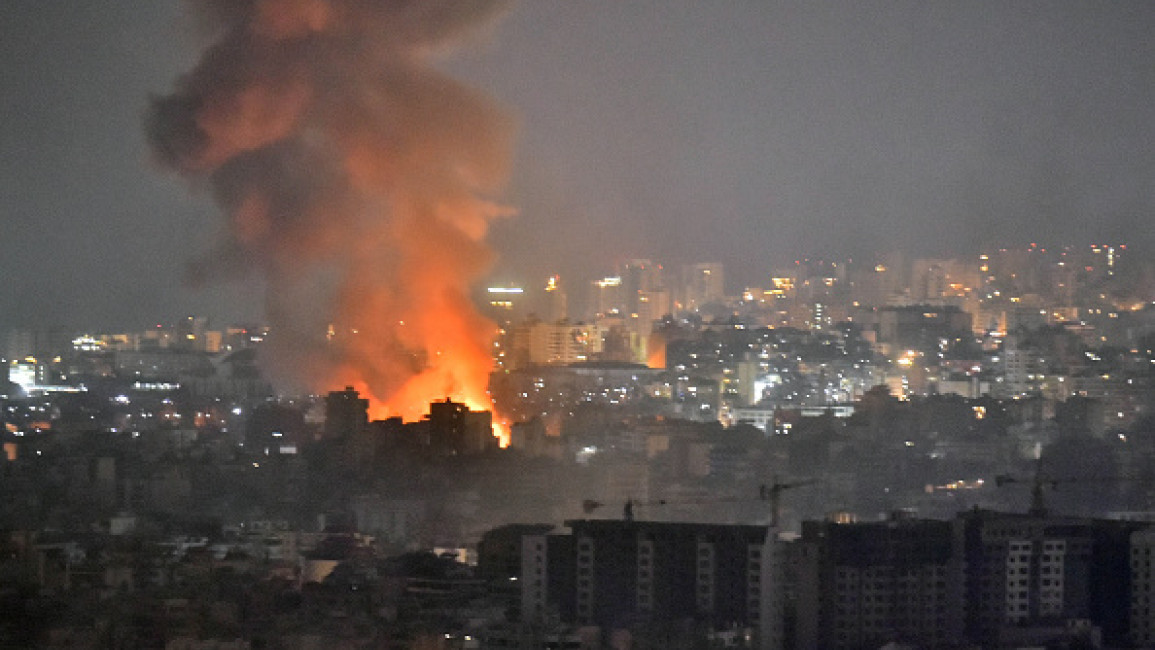
The Lebanese army's balancing act as Israel wages war on Hezbollah

On 3 October, Israeli military forces struck a Lebanese Armed Forces (LAF) post in Bint Jbeil in southern Lebanon, killing one soldier, as Israel pushed ahead with a ground invasion of the country.
During the incident, and for the first time since hostilities began in October 2023, Lebanese soldiers returned fire at Israeli forces. That same day, another Lebanese soldier lost his life in separate Israeli strikes in the region.
These Israeli attacks on Lebanon's army were not an isolated incident. On 30 September, Israel killed a Lebanese soldier with a drone strike targeting a motorbike at a checkpoint in southern Lebanon.
More recently, on 11 October, two Lebanese soldiers were killed and three others injured in Kafra by an Israeli airstrike, hours after the Israeli military fired on the headquarters of UNIFIL, the UN’s peacekeeping mission in Lebanon.
The killing and injury of Lebanese soldiers in Israeli attacks might suggest a direct engagement is imminent between the Lebanese Armed Forces (LAF) and the Israeli army. This, however, is unlikely to happen.
What role does Lebanon's army play?
The Lebanese army’s role in the war between Israel and Hezbollah is nuanced; it is not neutral, but it is also not actively involved in combat.
Lebanon’s army finds itself in a particularly challenging situation, tasked with protecting the Lebanese border from the advancing Israeli invasion while simultaneously avoiding direct confrontation with Israel.
More specifically, the Lebanese army is trying to implement the United Nations Security Council Resolution 1701, adopted in 2006, which sought to resolve the conflict between Israel and Hezbollah by establishing a buffer zone in southern Lebanon after the Second Lebanon War.
This resolution stipulates the withdrawal of Israeli forces, the disarmament of militias, and the deployment of both the Lebanese army and UNIFIL in southern Lebanon to monitor the ceasefire and maintain peace.
Within this legal framework, UNIFIL supports the Lebanese army in maintaining security and facilitating humanitarian aid, as well as preventing unauthorised weapons and armed groups in the region.
However, events following Israel’s decision to invade Lebanon show that this legal framework was never fully implemented. The ongoing chaos in southern Lebanon, with Hezbollah fighting to repel an Israeli invasion, has led Israel to directly attack UNIFIL on several occasions, including assaults that injured four peacekeepers in two days and disabled perimeter-monitoring cameras on UNIFIL positions, sparking international outcry.
On Sunday, Israeli Prime Minister Benjamin Netanyahu demanded that UNIFIL - a mission of about 9,500 troops of various nationalities created following Israel's 1978 invasion of Lebanon – leave their positions in south Lebanon. The UN chief said Israeli attacks on UNIFIL could constitute “war crimes”.
The Israeli military’s ground operations in southern Lebanon, which it says are aimed at dismantling Hezbollah’s capabilities and securing Israel’s northern border, were announced on 30 September following a deadly attack on the group using booby-trapped communications devices.
|
|
Before the ground invasion began, huge Israeli artillery shelling and air raids targeted towns and villages in the south, killing nearly 600 people in one day. Since 8 October, 2,300 people have been killed and over 10,000 injured by Israeli attacks, most in the past three weeks.
However, Hezbollah is repelling Israeli ground forces attempting to infiltrate southern Lebanon, with fierce fighting reported.
Lebanon's army and UN Resolution 1701
To understand the role of the Lebanese army amid fighting between Israel and Hezbollah, it is crucial to refer to UN Resolution 1701.
Retired LAF Air Forces Brig. Gen. Andre Bou Maachar told The New Arab that the army is deployed in the southern Litani River sector under Resolution 1701, maintaining and defending its position while patrolling with UNIFIL forces.
“The Lebanese Army has two mechanised infantry brigades and a special forces regiment deployed in the southern Litani River sector,” Bou Maachar said. “With about 4,500 troops deployed and a lack of aerial defence weapons or air force capability to confront Israeli aggression, its remaining capability is suitable for peacekeeping, border observation, and maintaining stability.”
However, this is a limited deployment of armed forces in southern Lebanon, with UN Resolution 1701 stipulating the need for 15,000 Lebanese troops. This discrepancy is compounded by the LAF’s lack of necessary resources to effectively perform its duties.
Elie Elias, managing director at the Middle East Institute for Research and Strategic Studies, told TNA that the Lebanese army's ability to deploy more troops in the south hinges on political decisions influenced by Hezbollah’s presence in the government. “The issue isn’t about manpower or resources but political agreement,” he said.
Lebanon's army, which consists of three branches - ground forces, air forces, and a navy - is militarily outmatched by both Hezbollah and the Israeli army. It is underfunded and relies in part on international aid.
The ground forces, the largest and most powerful, include over 4,500 military vehicles, such as tanks and missile systems, responsible for defending Lebanon and conducting joint offensive operations. Key units comprise mechanised infantry, the Republican Guard, and elite forces like the Airborne Regiment and Commandos, which focus on reconnaissance and counterterrorism.
The LAF has limited air defence capabilities, which are insufficient to counter advanced aerial threats, such as those posed by Israel. The navy has 69 vessels to secure maritime borders, prevent smuggling, and protect Lebanon’s exclusive economic zone.
Although the Lebanese army has around 80,000 troops, only 5,000 are deployed in southern Lebanon. In 2021, Lebanon allocated about 3.4% of its GDP to military spending.
Since 2006, the US has contributed over $3 billion to the LAF, enabling it to serve as a stabilising force against regional threats.
In September, the Qatar Fund for Development announced a $15 million grant for fuel to support the LAF for three months. Overall, EU countries and other international and regional actors have supported Lebanon's army over the years.
|
|
As a result, its limited capacity prevents it from exceeding its role outlined in UN Resolution 1701 amid the war between Hezbollah and Israel.
The already limited capability of the army has further deteriorated due to the economic crisis that erupted in 2019, with the Lebanese pound losing over 90% of its value, significantly reducing soldiers’ salaries and the military’s budget.
Bou Maachar explained that the economic crisis means outdated equipment in need of maintenance cannot be replaced, directly affecting the army’s readiness and operations.
“Army personnel are also facing salary cuts, reduced incentives, and declining morale, with morale being the most affected,” the retired LAF Air Forces Brig. Gen said.
What is also relevant to understanding the army’s role amid the current war in Lebanon is the Lebanese caretaker government’s efforts to broker a ceasefire between Hezbollah and Israel. This has become a top priority for Beirut.
Elias explained that the LAF’s operations are linked to government policy, and its inactivity in the conflict reflects the government’s minimal actions.
“The LAF’s operations reflect the government’s policy. The army’s role is largely paralysed, reduced mainly to humanitarian support for civilians in southern villages,” he said.
Bou Maachar emphasises that while Hezbollah operates independently, the LAF functions under the direction of the Lebanese government and, therefore, “the army continues to implement the UN Resolution 1701 and protect its assigned centres, acting in self-defence without any shift in its role,” he said.
Elias explained that the LAF’s engagement in the conflict “would mean the involvement of the Lebanese government and people in the war, elevating it to an international level and likely bringing in the United Nations and the broader international community for support. While the LAF may not match regional powers in technology, its greatest asset lies in the backing and guarantees provided by the international community”.
The conflict between Hezbollah and Israel has highlighted the importance of the army in enforcing UN Resolution 1701. Last week, the US and France called for increased support for the LAF at the UN.
In the same week, a joint declaration from the MED9 Mediterranean Group summit in Cyprus, attended by leaders from nine European nations, emphasised the need for further assistance to Lebanon, particularly for the Lebanese army, which is seen as crucial for stability.
French President Emmanuel Macron stressed the importance of restoring the Lebanese army’s presence in southern Lebanon and reinstating the country’s sovereignty for lasting peace.
Beyond its military role, the army could play a crucial part in resolving Lebanon's political deadlock, as the country remains without a president and is governed by a caretaker government. The need for strong political and institutional leadership is more urgent than ever with the country engulfed by war.
And it wouldn’t be the first time; the army has a history of producing presidents.
The current commander, Gen. Joseph Aoun, was seen as a potential candidate to fill the two-year presidential vacancy before the escalation between Hezbollah and Israel.
However, Elias believes that Aoun’s potential presidency would only ease the immediate crisis, without providing a lasting solution.
While many political parties supported Aoun's nomination, it’s unclear now whether Hezbollah and its political allies would agree on his candidacy, as he is favoured by the US.
Dario Sabaghi is a freelance journalist interested in human rights.
Follow him on Twitter: @DarioSabaghi





 Follow the Middle East's top stories in English at The New Arab on Google News
Follow the Middle East's top stories in English at The New Arab on Google News


